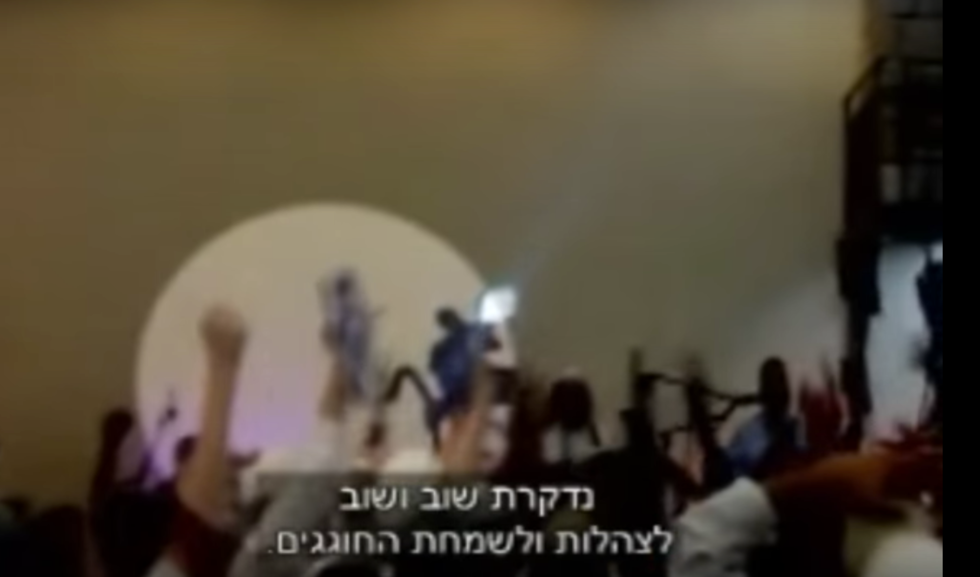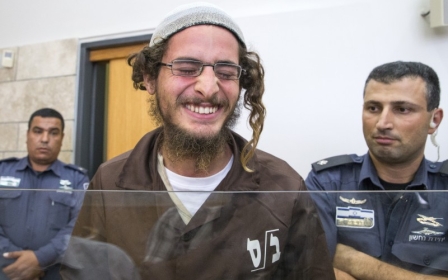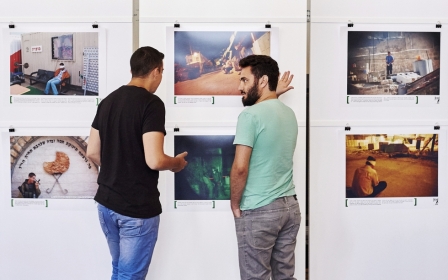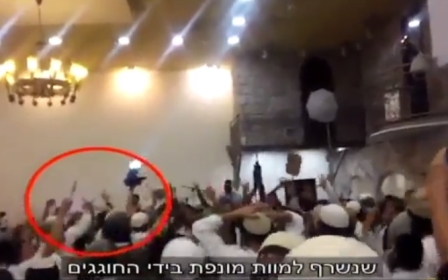The right going the wrong way

A week after Israel's right wing launched a concerted attack on human rights activists by releasing a video clip depicting them as traitors and collaborators with the "Palestinian enemy," a new video clip is putting the same right wing on the defence. Now it is its time to distance itself from the bloodthirsty images that this video clip associates it with.
The video clip, released on Israel's Channel 10, documents an ecstatic dance during a wedding between two extreme-right activists in which dozens of men fired machine guns and pistols into the air and chant verses from the Bible calling for revenge, with modern adaptations directing them against Palestinians.
At the height of the dance, some of them stabbed the picture of Ali Dawabsheh, the 18-month-old Palestinian baby burned to death in August as a result of an arson attack on his family home in the village of Duma near Nablus.
This quasi-pagan scene came just as the investigation led by Israel's General Security Service (better known by its Hebrew acronym, Shabak) is allegedly close to indicting a group of right-wing extremists, among them two sons of well-known rabbis in the settler community, as responsible for this murder.
The fact that dozens of right-wing activists openly celebrated the murder of the Dawabsheh baby served as unchallenged proof that this arson attack was not the work of some lunatics on the fringes of the settler community but part of an organised group aiming at the lives of Palestinian civilians.
It is proof that they are not "wild thorns," as right-wing leaders – from Jewish Home leader Naftali Bennett to Prime Minister Benjamin Netanyahu - try to portray them, but a prosperous and dangerous wood - and a clear embarrassment to Bennett and his like.
The origins of this "wood" go back to 1998, when Ariel Sharon, then foreign minister in Benjamin Netanyahu's first government, called on settlers to take over every empty hill in the West Bank in order to prevent further concessions to the Palestinians. "What you will take over will be ours, what you will not take over – not," were Sharon's words.
Upon Sharon's call, some hundred illegal outposts were raised all over the West Bank, many of them on private Palestinian land and sometimes in open defiance of the very Israeli army ruling there.
These outposts became a sort of no-man's land, where the rule of law was not effectively applied and where a young generation of settlers, now named "hilltop youth," could continue the "revolution" of its fathers and exercise its own expansion policy into the West Bank, without having to bother with the restrictions that the older generation had to accommodate in order to maintain good relations with the government.
The established leadership of the settlers was always ambiguous regarding this "hilltop youth". On the one hand, these young activists were too independent both in their attacks against Palestinian civilians and against Israeli soldiers and policemen. On the other hand, their aggressiveness towards Palestinian farmers allowed the settlements to spread their control over large parts of the West Bank, far beyond the already generous borders allocated to them by the government.
These outposts, together with some of the more extreme settlements in the Nablus area, became the ground on which a new openly racist and subversive ideology has flourished. The book Torat Ha-Melech (The King's Teachings), published a few years ago by followers of the influential Rabbi Yithak Ginzburg, summarised this new ideology, according to which it is allowed to kill the enemy's infants "if there is a good chance they will grow up to be like their evil parents”.
It is even allowed to kill your own citizens, if they "encourage" the enemy. The goal, according to these rabbis, was not only to drive away the Palestinians from the Holy Land, but also to topple Israel's secular democratic system and replace it with the "Kingdom of God".
Some of the settlers' leaders did condemn these writings and the continued attacks on Palestinians civilians and their property, which were given the euphemistic name of Price Tag (Tag Mehir in Hebrew), but overall this leadership failed to distance itself from the "hilltop youth". The outposts were generously financed by "established" settlements, and the perpetrators of the attacks on Palestinians were very rarely caught and brought to trial. A well-organised lobby supported them.
The arson attack that killed three members of the Dawabsheh family forced a change. International pressure on Israel to show that it did not ignore the murder of Palestinians who live under its jurisdiction played a part in the eagerness shown by security services, above all the Shabak, to catch the arsonists. But that is only part of the story. Israeli security services would like to tell themselves that if Palestinians are not involved in attacks against Israelis, then their lives are safe under Israeli rule. The arson in Duma proved otherwise.
The concentrated effort to catch the murderers from Duma, including the alleged use of torture against the key Jewish suspects, is tearing apart the national-religious sector, whether they live in settlements or inside the Green Line.
This community has come to view itself as Israel's new ruling elite. They occupy an ever-larger place in the high command of the army. The head of the Shabak comes from the national-religious sector, and only in the past few months representatives of this sector were nominated as heads of the police and the Mossad intelligence service and as general attorney.
Bennett, who is their most prominent leader, does not hide his intention to become Israel's first ever religious prime minister. Associating himself with the ecstatic dancers who stabbed Dawabsheh's picture will surely not lead him to this desired goal and he has taken steps to distance himself from them.
On the other side stand the "hilltop youth," who feel betrayed by Bennett and other right-wing leaders. According to their side of the story, they were encouraged to take over the hills of the West Bank for the sake of the settlement project. By their violence against Palestinians, they felt they are serving the goal of showing "who is the boss" in the West Bank. Now they feel that they are being dumped because Bennett wants to portray himself as a "respectable" leader.
These young extremists still enjoy a considerable lobby within the established right-wing circles. MP Betzalel Smutritz from the Jewish Home party claimed that the arson in Duma cannot be regarded as "terror". Justice Minister Ayelet Shaked from the same party demanded an inquiry into whether the suspects in the Duma killing were tortured in custody, as if they were Palestinians who have been treated this way for decades.
The vocal demonstrations against the alleged tortures by the Shabak on the one hand and the embarrassing video clip from the wedding on the other pushed Bennett to distance himself publicly from the "hilltop youth" and their supporters. Their goal, he warned, is "to dismantle the state of Israel," and we, "the religious Zionists … must take responsibility" for this state.
There are two ways to look at this internal rift. One is that it is a sophisticated trick by the settlers' camp to portray itself as a responsible actor fighting against extremism, while at the same time allowing these very extremists to go wild against Palestinian lives and property.
A second interpretation is that the settler community is now facing the true contradictions of its line. For years, it has told itself and the Israeli public, that Palestinians could live "normal" lives side by side with the settlers, and if it were not for human rights activists in Israel and "anti-Semitic" international governments, Israeli rule could go on forever as it is in the West Bank.
The events in Duma and the ecstatic dancers at the wedding may show Bennet and other leaders that the reality is more complicated. It may be too early to talk about the awakening of this camp, but it might be that it starts to understand its shortcomings.
- Meron Rapoport is an Israeli journalist and writer, winner of the Napoli International Prize for Journalism for a inquiry about the stealing of olive trees from their Palestinian owners. He is ex-head of the News Department in Haaertz, and now an independent journalist.
The views expressed in this article belong to the author and do not necessarily reflect the editorial policy of Middle East Eye.
Photo: A Channel 10 report shows wedding guests stabbing a photo of the Dawabsheh baby (YouTube/Channel10)
Middle East Eye propose une couverture et une analyse indépendantes et incomparables du Moyen-Orient, de l’Afrique du Nord et d’autres régions du monde. Pour en savoir plus sur la reprise de ce contenu et les frais qui s’appliquent, veuillez remplir ce formulaire [en anglais]. Pour en savoir plus sur MEE, cliquez ici [en anglais].





